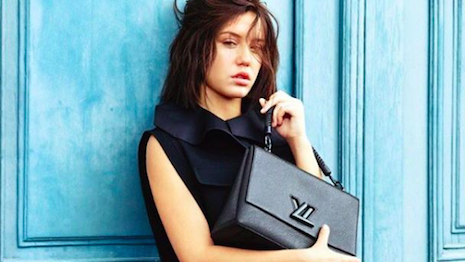- About
- Subscribe Now
- New York,
August 22, 2017

 Image from Louis Vuitton's spring/summer 2017 campaign. Image credit: Louis Vuitton
Image from Louis Vuitton's spring/summer 2017 campaign. Image credit: Louis Vuitton
While the luxury goods sector is continuing to see low profit numbers, brands and retailers should look to millennials as their saving grace.
During the first half of 2017, full-priced sales of luxury goods dropped by 7.8 percent year-over-year. In a new report from EDITED, the retail analytics company shows that millennials will be the key demographic for these brands in the future, as they currently hold the spot as the largest generation.
“With its low prices and swiftly developing trends, fast fashion has facilitated this demographic's endless switching up of garments,” said Katie Smith, senior retail analyst at EDITED. “But that's not to say the millennial shopper isn't attuned to the finer things in life, which is where luxury accessories play a key role."
EDITED looked at and analyzed 30 U.S. luxury womenswear retailers and more than 5,000 brands for the report.
Goods are growing
Luxury sales may still be down but things are slowly improving. For instance, luxury retailers within this first half of the year have shown a 5 percent decrease in discounts, indicating they are relying less on price cuts.
Sales of luxury bags at full price are up 22 percent, averaging at $1,465.07 per bag.
Chloe handbags. Image credit: Chloe
Hats are seeing the biggest growth of all with an increase of 83 percent with a price average of $398.55. Scarves have seen a spike of 20.4 percent priced at $664.12.
Louis Vuitton, Gucci, Saint Laurent, Valentino and Dolce & Gabbana topped the list as the highest sellers in Q1 this year, but Gucci saw the most success with handbags. Full-priced Gucci handbag sellouts saw 595 percent growth, likely related to its new designs aimed at younger consumers.
Gucci pre-fall 2017 collection. Image credit: Gucci
EDITED’s research shows that the greatest potential is with accessories in terms of a successful future for luxury. Gucci’s strategy is a testament to both the potential of accessories as well as the power of younger consumers.
Additional insight
Surprisingly, Generation Z is more likely to be interested in and buy luxury goods than their older millennial counterparts, suggesting that luxury brands should readjust how they view the strategic value of the two demographics.
This data comes from InMarket, which published a report called “From Gen Z to Boomers:Ranking Businesses Based on Generational Foot Traffic” seeking to lay out the different shopping habits of each generation. The data showed that Gen Z customers frequent luxury retailers more often than millennials, who prefer discount brands (see more).
Also, travel experiences are proving to be dramatically more important to affluent millennials, with most interested in hotel accommodations and flight tickets rather than luxury goods.
A recent report from Agility showed that across the globe the majority of prosperous millennials are likely to travel abroad in the next year. Percentages in China, India, Singapore, Malaysia, Hong Kong, South Korea and Taiwan are all above 71 percent for those interested in abroad travel over the next 12 months (see more).
“For millennials, these kinds of items represent better value as they're a way to affiliate with a brand or lifestyle but can be worn across multiple looks and in different stylings,” Ms. Smith said.
Share your thoughts. Click here